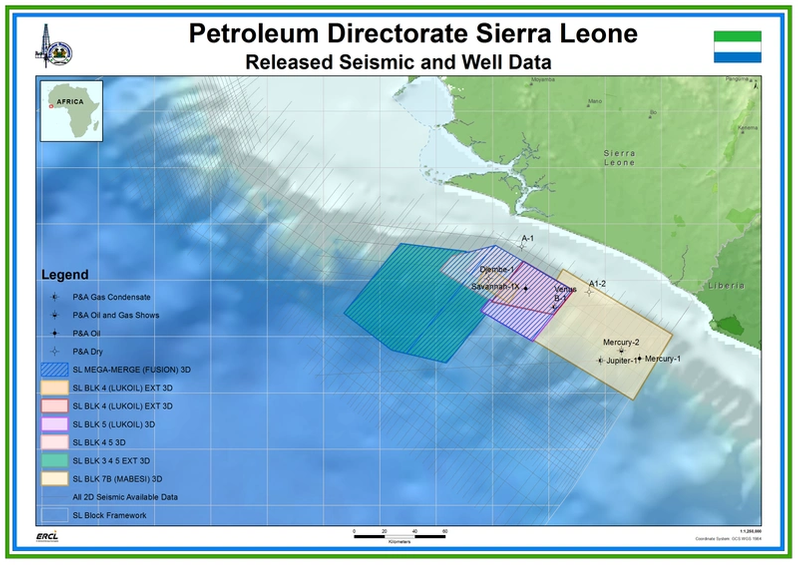Sierra Leone has put on a brave face and announced a rehashed package for bidders interested in taking part in its fourth hydrocarbons licensing round that was suddenly put on the ice in September 2018 after a new administration took charge of the West African country following successful Presidential elections.
After long spells of battling the deadly Ebola virus and managing to achieve a semblance of political and economic stability, Sierra Leone says it is now ready to restart last year’s suspended fourth licensing round targeting offshore prospects after what the government says was broad consultation process involving domestic and international petroleum industry players.
Although the country is grappling with high unemployment levels, persistent graft claims and a generally weak governance structure as it still continues to recover from the than one decade of civil war, Sierra Leone has this week come out to reaffirm the soundness of its new regulatory and fiscal framework on which the success or failure of the new licensing round will be hinged on.
Getech Group, a partner with government hydrocarbons agency Petroleum Directorate of Sierra Leone (PDSL) – which coordinates the award of petroleum licenses, negotiates the terms of all hydrocarbon permits, monitors, regulates and facilitates upstream oil activities on behalf of the government – publicized the official announcement of the stalled licensing round suspended in September 2018 and follows on the footsteps of similar undertakings in 2003, 2004 and 2012. Last year’s suspension of the oil block’s auction was ostensibly to allow for wider consultations on how best to re-structure the bidding to ensure heightened interest of international explorers and independents.
“Following the conclusion of a six-month industry consultation that was designed to collate international industry feedback and ensure the success of this round, companies are now invited to re-engage with the Fourth Licensing Round,” Getech said in a statement.
“Working in partnership with the Petroleum Directorate of Sierra Leone, we are delighted to support the reopening of the Fourth Licensing Round,” added Jonathan Copus, Getech Group CEO in the Getech statement.
The previous three bids attracted mixed response with four blocks awarded in the first round of 2003 while only one block was awarded in 2004 followed by one more in 2006 that was allocated through direct negotiation in 2006.
However, during third round of 2012, eight blocks were awarded and a more robust response is expected this time round especially after PDSL said it has “collated international industry feedback to ensure the success of the bidding round.”
Sierra Leone is restarting the fourth licensing round at a time when PDSL has in stock four undeveloped offshore discoveries made between 2009 and 2013.
They include Venus-B1, Mercury-1, Jupiter-1 discovered by Anadarko in Block SL-07 and Savanaah-1 by Lukoil in Block SL-05/11 all of them in Sierra Leone waters that PDSL says “contain proven petroleum systems.”
Moreover, the PDSL has not clearly pointed out what has changed between September 2018 and now especially with the indictment from Africa Petroleum, which relinquished its interests in licenses SL-03-17 and SL-4A-17 in November of last year in what the company said was a result of the decision not to commit to an ultra-deep water drilling program.”
But more telling was Africa Petroleum confession that even after months of discussion with PDSL, “the parties failed to agree an extension to the licences on suitable terms.”
In this week’s statement by Getech Group, PDSL is said to have committed to “re-engage” with potential explorers during the fourth licensing round after “putting in place a robust but flexible licensing framework that will assist investors in their evaluation of the significant potential of the Sierra Leone margin.”
The optimism by Sierra Leone is despite the observation by Africa Petroleum that the “industry appetite does not currently exist for ultra-deepwater exploration in this part of the African margin.”
Africa Petroleum’s view is shared by Olu Adeosun, Director, PwC Advisory, Strategy Consulting, in an interview with Offshore Engineer when he said “offshore projects are particularly highly capital intensive, investors have been particularly unwilling to cover unnecessary risks posed by poorly-regulated sector.”
However, PDSL says the country’s offshore waters is now “fully for petroleum licensing” and that this time around a more flexible Block framework will be used as a basis for licensing. Nearly 20 concessions are open in Sierra Leone according to PDSL.
For potential bidders eyeing offshore prospects with 50% of such an acreage found deeper than 2,500 meters, PDSL has launched a direct tender license application process while all other bids will be under open tender.
In addition, potential bidders can now access the previously set up data rooms in Sierra Leone’s capital Freetown, London and Houston to view the available 2D and 3D seismic data and all about the eight previously drilled wells.
 Sierra Leone’s offshore seismic and well data (Image: PDSL)
Sierra Leone’s offshore seismic and well data (Image: PDSL)



